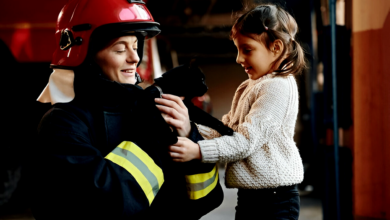
Winter Pet Care in the UK: How to Keep Pets Warm & Safe
As the cold season approaches, winter pet care in the UK becomes a crucial responsibility for pet owners. The harsh weather conditions, shorter days, and freezing temperatures
As the cold season approaches, winter pet care in the UK becomes a crucial responsibility for pet owners. The harsh weather conditions, shorter days, and freezing temperatures can pose serious threats to pets, requiring owners to take extra precautions to keep them safe and warm. Whether it’s ensuring they have appropriate shelter, maintaining their diet to support their energy needs, or protecting them from winter hazards, a well-thought-out winter care routine is essential.
Many pet owners underestimate the dangers that winter can bring, from frostbite and hypothermia to toxic substances like antifreeze. In the UK, where winter temperatures often drop to near-freezing levels, both indoor and outdoor pets require special attention to stay comfortable and healthy. Understanding their specific needs and adjusting daily care routines accordingly can prevent potential health issues and ensure your furry companions enjoy the season safely. This guide will provide essential winter pet care tips and UK-specific safety standards to help you navigate the colder months with confidence.
Understanding Winter Risks for Pets
Cold Weather Dangers
Winter temperatures in the UK can be harsh, particularly for small and short-haired pets. Prolonged exposure to the cold can lead to hypothermia and frostbite, which occur when body temperatures drop significantly, leading to tissue damage. Symptoms of hypothermia include shivering, lethargy, weakness, and cold ears or paws. Frostbite can affect extremities such as the nose, ears, and tail, making it crucial to minimize exposure to freezing conditions.
For dogs and cats that spend time outdoors, it’s essential to limit their time outside, especially during icy and snowy weather. Pet clothing, such as insulated jackets and booties, can help retain body heat and protect paws from cold surfaces, ice, and harmful chemicals used for de-icing roads and pavements.
Toxic Winter Substances
Antifreeze is a common winter hazard for pets, as its sweet taste can be appealing to animals, but ingestion is highly toxic and often fatal. Even small amounts of antifreeze can cause kidney failure in cats and dogs. To prevent accidental poisoning, always clean up spills immediately, store antifreeze securely, and opt for pet-friendly alternatives when possible.
Grit and salt used for de-icing roads and pavements can also be harmful if ingested or if they come into contact with pets’ paws. Salt can cause irritation, dryness, and cracking, making it important to rinse and dry your pet’s paws after outdoor walks. Providing a pet-safe balm can help prevent paw damage and discomfort.
Keeping Pets Warm Indoors
Creating a Cozy Environment
During winter, pets may need extra warmth indoors to stay comfortable. Keep their bedding away from drafts and ensure they have a soft, insulated place to rest. Heated pet beds or blankets can provide additional warmth, especially for senior pets or those with arthritis, as cold weather can exacerbate joint pain.
It’s important to monitor room temperatures and ensure your home remains warm enough, particularly at night. Cats often seek out warm spots such as radiators, so providing pet-friendly radiator beds can keep them comfortable. Similarly, dogs may prefer cozy corners or covered beds to retain body heat.
Adjusting Diet and Hydration
Winter weather can affect your pet’s metabolism, leading to increased energy demands. Active pets that spend time outdoors may require slightly more food to maintain their body temperature, whereas indoor pets with reduced activity levels should have portion-controlled diets to prevent weight gain. Always provide fresh water, as dehydration can still occur during winter, especially when heating systems make indoor air drier.
Consider incorporating foods that support joint health, such as those rich in omega-3 fatty acids, for older pets. Warming up wet food slightly before serving can also make meals more appealing and comforting during cold months.
Outdoor Safety Measures
Safe Walks in Cold Weather
When taking dogs for walks in winter, it’s important to consider safety measures. Shorter, more frequent walks are preferable to long outdoor excursions, as they reduce exposure to freezing temperatures. Always dry your dog’s fur and paws thoroughly after walks to prevent chills and remove any harmful substances like salt or grit.
Reflective gear or LED collars can be useful during the shorter daylight hours to enhance visibility and safety. In icy conditions, choose safe walking routes to prevent slipping hazards, both for you and your pet. If necessary, use pet-friendly paw protectors to prevent ice buildup and irritation.
Providing Shelter for Outdoor Pets
If your pet spends significant time outdoors, providing adequate shelter is essential. Outdoor kennels or hutches should be insulated, waterproof, and elevated to prevent dampness. Ensure bedding is thick, warm, and changed regularly to avoid moisture buildup.
For small pets such as rabbits and guinea pigs, hutches should be moved to sheltered areas, such as garages or sheds, to provide extra warmth. Covering enclosures with blankets or tarpaulins while allowing for ventilation can help retain heat and block cold winds.
Special Considerations for Different Pets
Cats and Winter Safety
Cats are known for their curiosity and love of exploring, but in winter, it’s advisable to limit their outdoor activities. If your cat insists on going outside, ensure they have access to a warm, dry shelter. Check under cars before starting the engine, as cats often seek warmth by hiding near car engines, which can be extremely dangerous.
Indoor enrichment is important during the colder months to prevent boredom. Providing interactive toys, scratching posts, and climbing areas can help keep your cat entertained and mentally stimulated while staying safe inside.
Small Pets and Winter Care
Rabbits, guinea pigs, and other small pets require special winter care, as their enclosures can quickly become too cold. If moving their hutch indoors isn’t possible, extra insulation is necessary. Use thick bedding materials like straw, hay, and fleece to keep them warm. Regularly check water bottles to ensure they haven’t frozen, and consider using bottle covers or insulated holders to prevent this.
Providing additional hiding spots and snuggle areas can help small pets stay warm, and increasing their food intake slightly may help them generate more body heat.
Read More: Essential Vaccinations for Pets in the UK: What’s Required?
Conclusion
Winter pet care in the UK requires careful planning to ensure pets stay warm and safe despite the harsh weather conditions. Being aware of common cold-weather dangers such as hypothermia, frostbite, and toxic substances like antifreeze can help pet owners take proactive measures to prevent harm. Adjusting your pet’s diet, providing extra warmth indoors, and limiting outdoor exposure are crucial steps in winter care.
With the right approach, pets can enjoy a comfortable and secure winter. Regularly assessing their needs and making necessary adjustments to their daily routines will ensure they remain healthy and happy throughout the season. By understanding the specific challenges of UK winters and following safety recommendations, pet owners can create a safe and cozy environment that allows their furry companions to thrive.
FAQs
1. How can I tell if my pet is too cold?
Signs that your pet is too cold include shivering, reluctance to move, curled-up posture, and cold ears or paws. If your pet shows these signs, bring them inside and warm them gradually.
2. Do pets need coats in winter?
Some pets, especially short-haired dogs and senior animals, benefit from wearing insulated coats during winter walks. Breeds with thick fur may not need extra layers, but always monitor their comfort.
3. How do I keep my pet’s paws safe in winter?
Rinse and dry paws after walks to remove salt, grit, and ice. Consider using pet-safe paw balm to prevent cracking and irritation.
4. Can cats go outside in winter?
Cats can go outside in winter, but it’s best to limit their time outdoors. Provide a warm shelter, and always check under your car before starting the engine, as cats may seek warmth there.
5. How do I prevent my pet’s water from freezing?
For outdoor pets, use insulated water bottle covers or place water dishes in sheltered areas. Regularly check and replace water to ensure they stay hydrated.







